It’s a typical school day. Your child comes home, drops their bag, and complains of a headache and feeling tired. You assume it’s just a long day—but what if it’s not just about being tired? What if it’s a result of a lack of hydration?
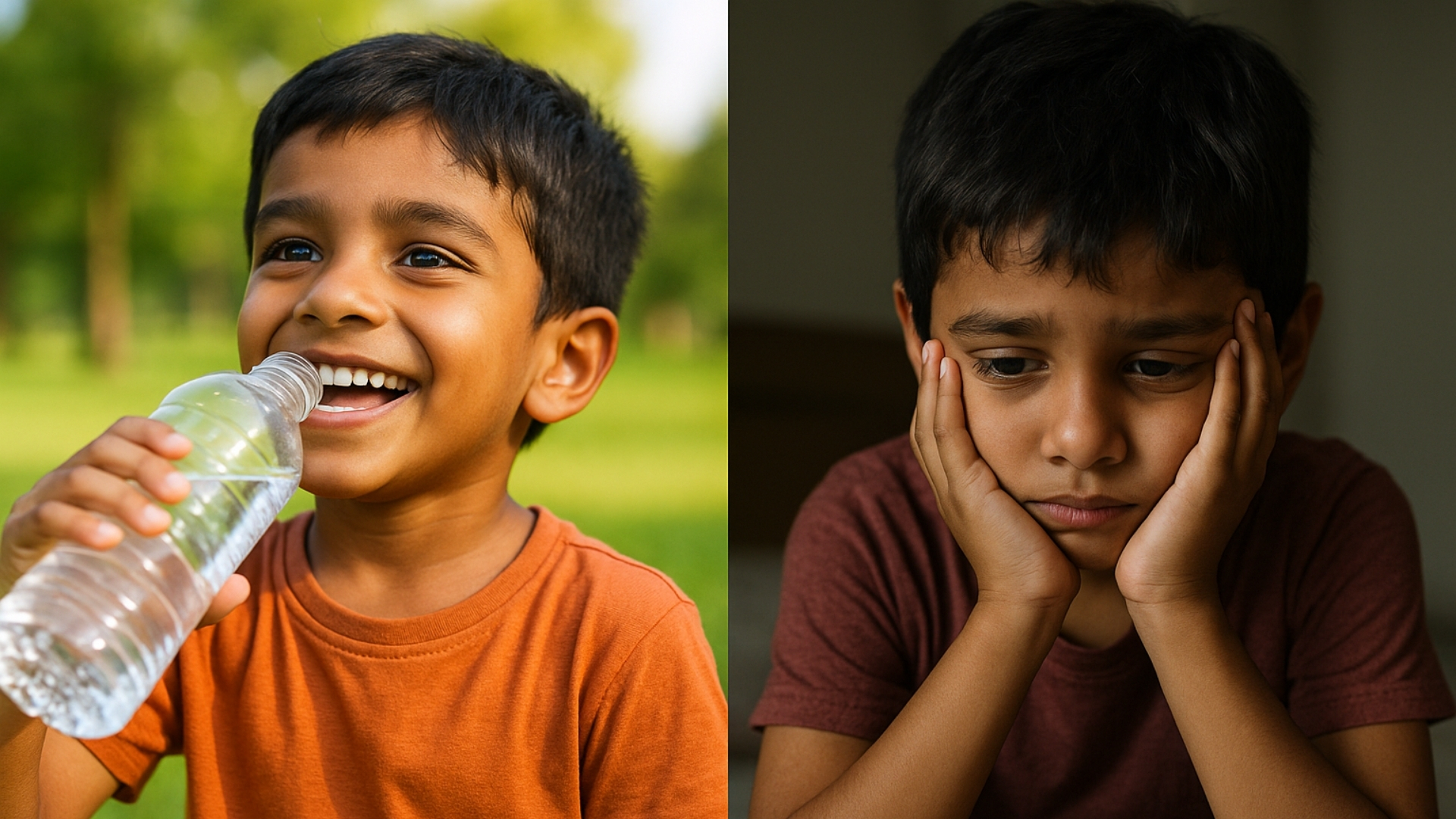
Many parents focus on food when thinking about their child’s health, but the importance of hydration is often overlooked in daily routines. We talk about fruits, vegetables, and proteins—but how often do we ask, “Has my child had enough water today?” Proper fluid intake is not just about quenching thirst. It’s about fueling the body, energizing the brain, and supporting key bodily functions that keep children active, happy, and healthy.
Did you know that even mild dehydration can affect your child’s concentration and mood? Studies show that a dehydrated brain can struggle with memory, focus, and even emotional regulation. That means everything from school performance to behaviour at home can be impacted.
Encouraging your child to stay hydrated isn’t just about handing them a glass of water—it’s about building consistent habits with smart choices like hydrating beverages, juicy fruits, and routine daily fluid intake.
When it comes to nutrition and hydration, water plays a vital role in digestion, nutrient transport, and temperature regulation. Simply put, hydration for health is non-negotiable. Let’s shift the conversation and understand that drinking more water could be the easiest health upgrade your child needs today.
How Much Water Do Children Really Need?
When it comes to nutrition and hydration, one of the most common questions parents ask is: “How much water should my child drink daily?” The answer isn’t one-size-fits-all. A child’s fluid intake depends on their age, activity level, diet, and even the climate they live in. In a country like India, where scorching summers and high humidity are common, it’s even more essential to ensure kids stay hydrated throughout the day.
General Daily Water Intake Guidelines by Age
Age Group | Recommended Daily Fluid Intake |
1–3 years | 4 cups (approx. 1 liter) |
4–8 years | 5 cups (approx. 1.2 liters) |
9–13 years (girls) | 7 cups (approx. 1.6 liters) |
9–13 years (boys) | 8 cups (approx. 1.9 liters) |
14+ years | 8–10 cups (2–2.5 liters) |
Tip: These amounts include water from all hydrating beverages like milk, juice, and also water-rich foods like fruits and vegetables.
Summer vs Winter Hydration
In the summer, children tend to sweat more, which increases the risk of lack of hydration. Their daily fluid intake should be slightly higher to compensate for water loss due to heat. On the other hand, in the winter, kids might feel less thirsty and naturally reduce their water consumption—but that doesn’t mean their bodies need less hydration. It’s crucial to encourage drinking more water, even when it’s cold.
Activity Level & Climate Impact
Active children who run, play, or participate in sports need more water to stay hydrated, especially after physical exertion. The warmer the climate, the more water the body loses through sweat. In humid regions of India, for instance, ensuring adequate hydration for health becomes even more vital. Parents should keep a water bottle handy and incorporate hydrating beverages like lemon water, coconut water, or diluted fruit juices during playtime or school breaks.
By understanding your child’s unique needs and adapting their fluid intake accordingly, you’re not just preventing lack of hydration—you’re actively supporting their growth, focus, and overall wellness.
Hydration & Brain Power: Focus, Attention, and Learning
Have you ever noticed your child struggling to pay attention during homework or feeling irritable during school hours? While it’s easy to blame screen time or sleep, a surprising culprit could be a lack of hydration. The importance of hydration goes far beyond physical health—it has a direct and powerful impact on your child’s brain function and learning ability.
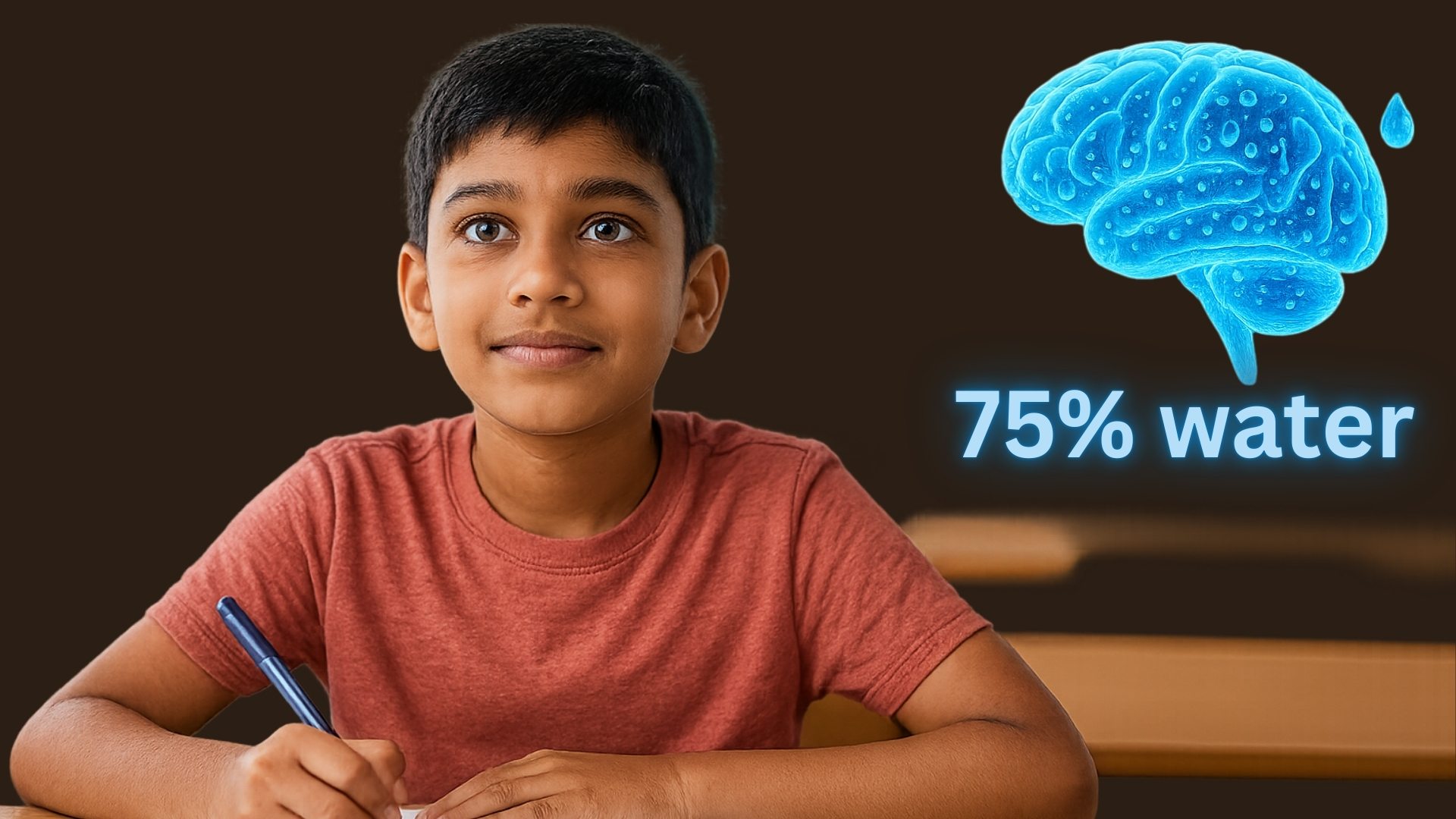
Our brain is made up of nearly 75% water. Even mild dehydration—just a 1–2% drop in body water—can lead to reduced cognitive performance. When children don’t stay hydrated, they may experience slower reaction times, trouble concentrating, forgetfulness, and mood swings. In contrast, consistent daily fluid intake helps regulate energy levels, supports memory retention, and boosts overall academic performance.
Studies have shown that school-aged children who had better fluid intake performed significantly better in attention and memory tasks compared to their dehydrated peers. Researchers also found that simply drinking more water before a test could improve children’s performance by up to 25%. That’s a simple trick during exam season that can make a huge difference!
In Indian classrooms, where children often spend long hours without adequate hydrating beverages, the risk of dehydration is high—especially during hot summer months. Encouraging your child to sip water regularly, especially between subjects or before studying, is key to nurturing not just their body, but also their mind.
Incorporating proper nutrition and hydration habits early helps children build a stronger foundation for lifelong learning. After all, hydration for health includes mental sharpness, emotional stability, and the focus they need to succeed.
Digestion & Detox: Water’s Role in a Healthy Gut
When we talk about children’s health, digestion often takes a backseat to more visible issues like immunity or growth. However, a well-functioning digestive system is essential for your child’s overall health and development. And one of the simplest yet most overlooked keys to good digestion is—water. The importance of hydration in maintaining a healthy gut cannot be overstated.
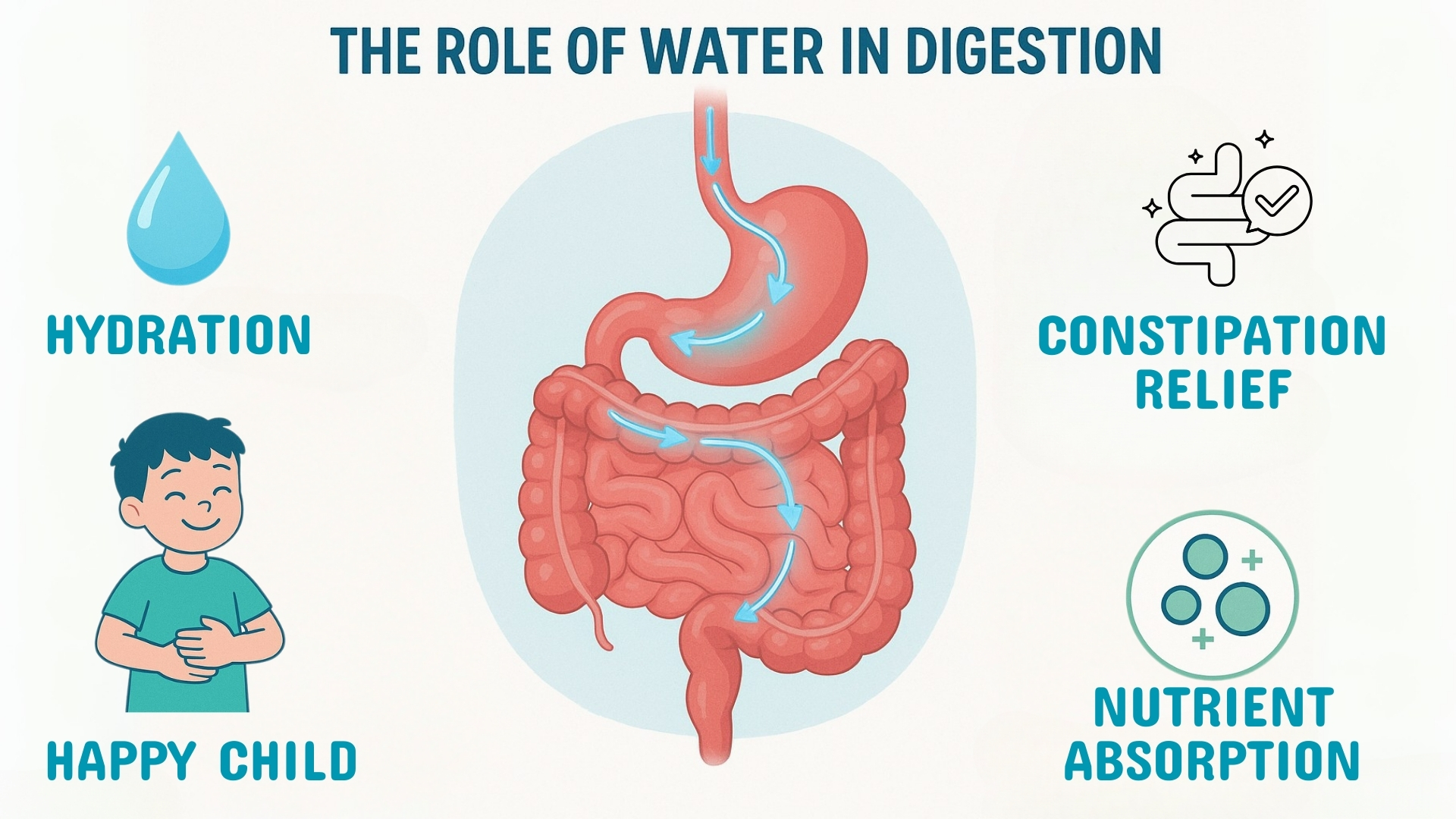
Link between Hydration and Smooth Digestion (Constipation, Bloating)
Children often experience digestive issues like constipation or bloating, especially when their diet includes dry, starchy, or low-fiber foods. One of the major causes of these issues is a lack of hydration.
When your child doesn’t stay hydrated, the colon absorbs more water from the food waste, making the stool harder and more difficult to pass. This results in painful bowel movements, irregular digestion, and crankiness. Proper fluid intake keeps the digestive tract lubricated, ensuring that food and waste move smoothly through the system.
The benefits of hydration go beyond just preventing constipation. Water also helps to reduce acid reflux, supports enzyme activity, and promotes a balanced gut microbiome. If your child often complains of stomachaches or bloating, increasing their daily fluid intake may be a simple, natural solution.
Water and Nutrient Absorption
Hydration also plays an important role in how well the body absorbs essential nutrients from food. During digestion, nutrients are broken down in the stomach and intestines, and then absorbed into the bloodstream. But without adequate water, this process slows down significantly.
Good nutrition and hydration work hand in hand. While a nutrient-rich diet is crucial, it won’t deliver its full benefits if your child is not drinking more water. Water acts as a carrier, transporting vitamins, minerals, and glucose to cells where they are needed for energy, growth, and repair.
So next time you serve a healthy meal, don’t forget to include a glass of water—it’s just as important as the food on the plate.
Tip: Pairing Water with Fiber-Rich Indian Foods (Dal, Sabzi, Fruits)
One of the smartest ways to promote gut health is by combining hydration with fiber-rich Indian foods. Fiber adds bulk to the stool, while water helps soften it, making elimination easier and more comfortable for children.
Ideal pairings include:
- Moong dal with water or buttermilk
- Sabzi (cooked vegetables) with roti and a glass of coconut water for dehydration
- Fresh fruits like papaya, guava, or oranges with a mid-morning hydrating beverage
Encourage your child to sip water regularly during meals, especially when eating fibrous foods. This not only prevents constipation but also keeps the digestive system functioning optimally.
In hot Indian summers, best drinks for dehydration besides water include lemon water with a pinch of salt, coconut water, and homemade fruit-infused waters. These not only replenish lost fluids but also add variety to their hydration routine.
Signs of Dehydration in Children Parents Shouldn’t Ignore
As parents, we often focus on what our children eat—but what they drink is just as important. A lack of hydration can quietly creep in and affect your child’s health long before it becomes obvious. That’s why it’s crucial to recognize the early signs of dehydration and respond quickly.
Children are more vulnerable to fluid loss than adults, especially during hot weather, illness, or periods of increased physical activity. If your child doesn’t stay hydrated, their body can’t function at its best, leading to fatigue, digestive issues, poor concentration, and even more serious complications.
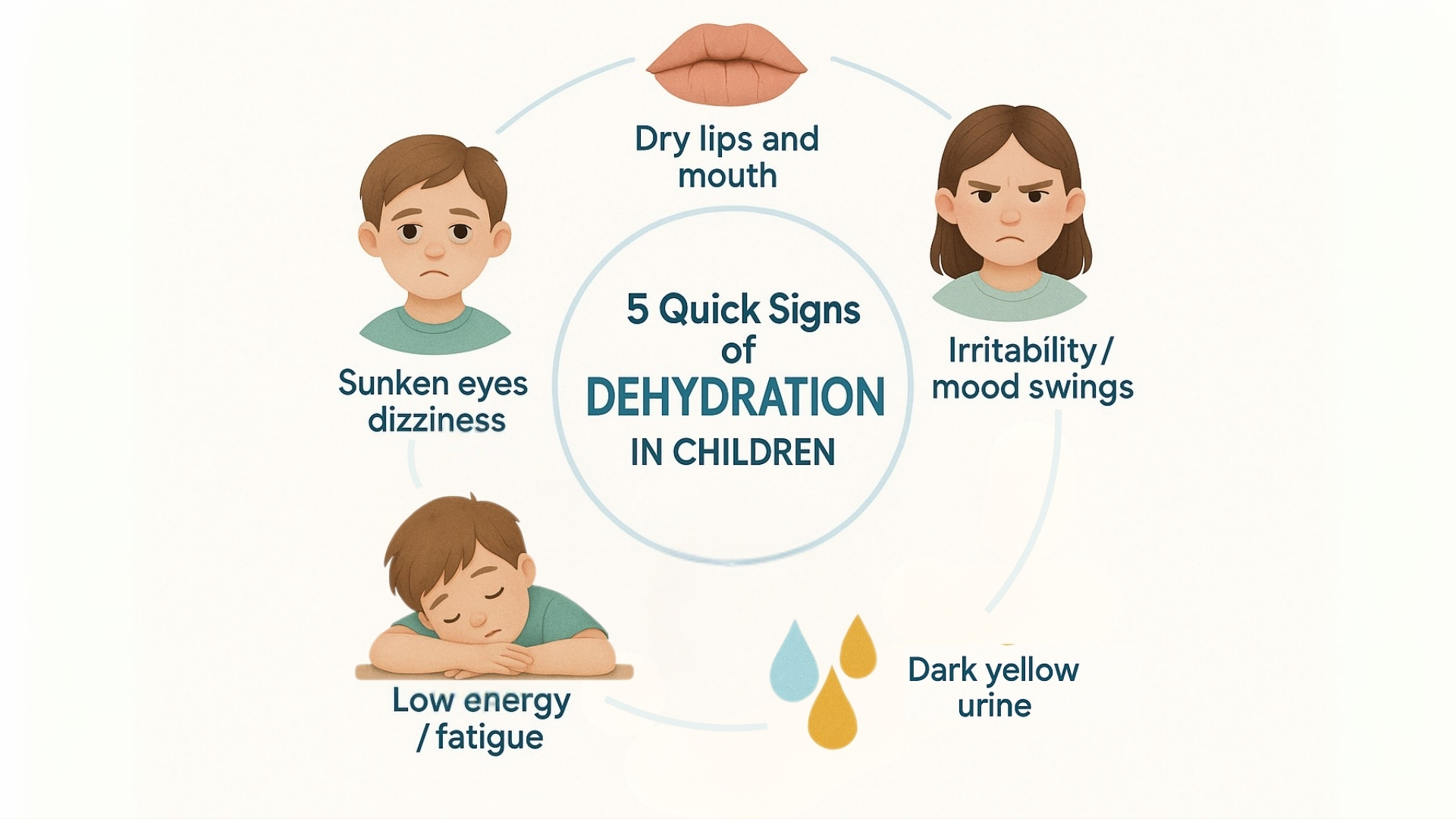
5 Quick Signs Your Child May Be Dehydrated
Here’s a simple visual-style checklist every parent should keep in mind:
Dry Lips and Mouth:
If your child’s lips look cracked or their mouth feels dry, it’s one of the earliest signs of low fluid intake.
Irritability or Unusual Mood Swings:
Dehydration can cause mood changes. If your child seems cranky or unusually tired, it may be time to encourage drinking more water.
Dark Yellow Urine or Less Frequent Urination:
A healthy, hydrated child will pass clear to light-yellow urine. If it’s dark or infrequent, their daily fluid intake may be too low.
Low Energy and Fatigue:
Water fuels energy. If your child is sluggish, lacks motivation, or looks visibly tired, dehydration might be the root cause.
Sunken Eyes or Dizziness (Severe Cases):
These are serious signs of severe dehydration and require immediate attention. Don’t wait—seek medical help and start replenishing fluids right away.
What You Can Do
The good news? Dehydration is preventable. Encourage your child to sip water regularly and offer hydrating beverages throughout the day, especially in hot weather or after play. For fussy drinkers, flavoured waters or electrolyte-rich options like coconut water for dehydration can be a great solution. In fact, coconut water is often considered the best drink for dehydration besides water due to its natural electrolytes and kid-friendly taste.
Regular reminders, colorful water bottles, and hydration-rich snacks (like watermelon, oranges, and cucumber) can make a big difference in your child’s fluid intake. And remember, promoting nutrition and hydration as a daily habit lays the foundation for strong immunity, better digestion, and sharper mental focus—the core benefits of hydration every growing child deserves.
Hydration for health is not a seasonal concern—it’s a year-round priority. Catch the warning signs early and help your child stay hydrated for a happier, healthier life.
Smart Ways to Keep Your Child Hydrated (Without Nagging!)
Let’s be honest—reminding your child to drink water can feel like a full-time job. And the more you remind them, the more they tend to resist. So how do you make sure your little one gets the daily fluid intake they need without turning it into a battle?
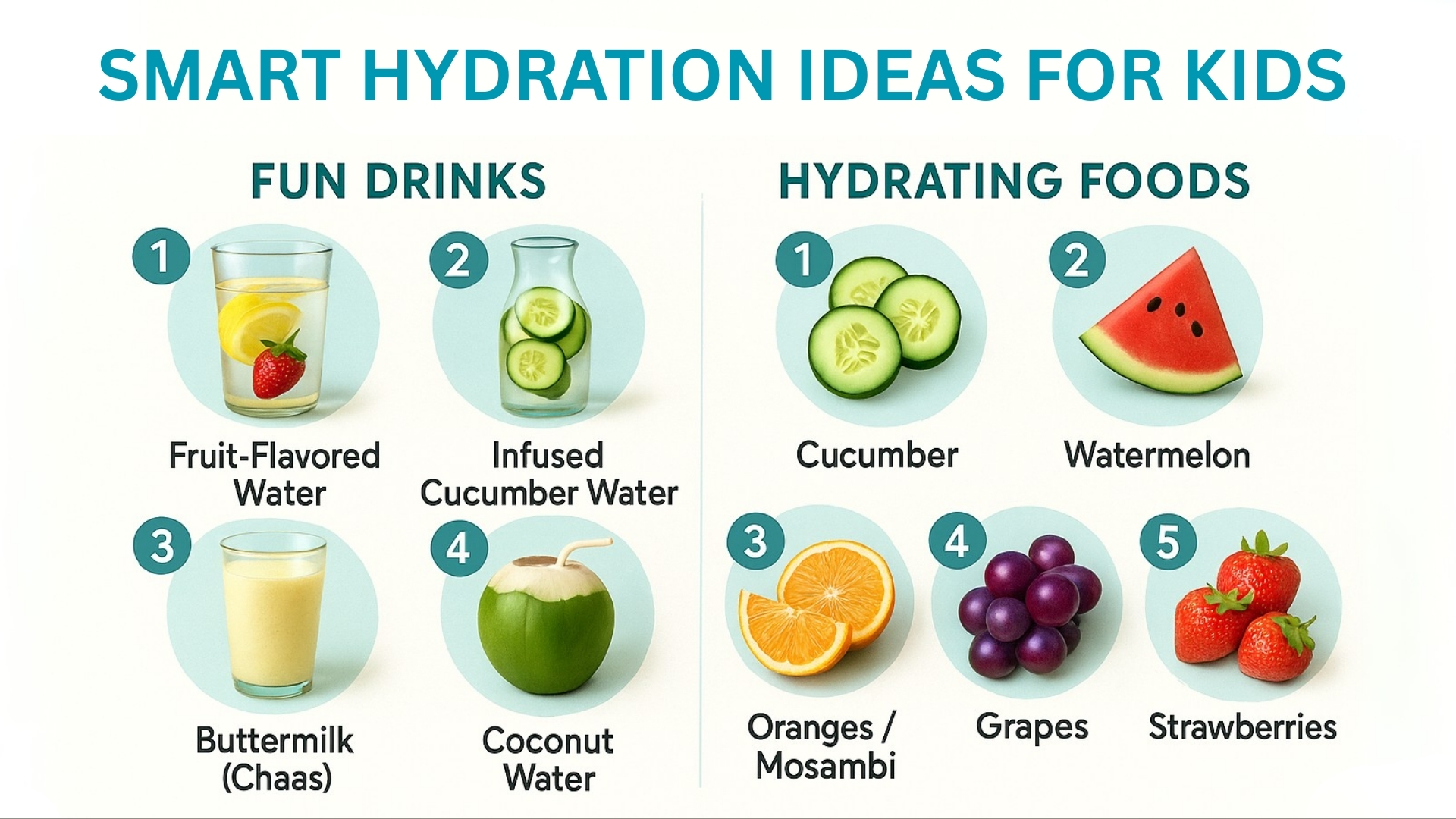
The trick is to make hydration fun, flavorful, and fuss-free. When kids enjoy what they’re drinking, they naturally reach for more—without being told.
Fun Hydration Ideas Kids Will Love
Ditch the plain water (at least sometimes!) and get creative with hydrating beverages that taste great and keep your child excited about drinking more water. Try these ideas:
Flavored water with fruits:
Add slices of lemon, orange, mint, or berries to their water bottle for a refreshing twist.
Infused water:
Soak fruits like cucumber, kiwi overnight in water. It’s like nature’s juice!
Buttermilk (chaas):
A probiotic-rich, salty beverage that’s perfect after lunch and supports digestion.
Coconut water for dehydration:
Naturally sweet and packed with electrolytes, it’s one of the best drinks for dehydration besides water—especially in Indian summers.
By rotating between these flavorful options, you’ll increase their fluid intake without the nagging.
Sneaky Hydrating Foods to Add to Their Plate
Not all hydration has to come from a glass. Many foods have high water content and contribute to your child’s daily fluid intake:
Cucumber:
Over 95% water and perfect as a lunchbox snack.
Watermelon:
A summer staple that offers hydration and antioxidants.
Oranges & Mosambi (Sweet Lime):
Vitamin C–rich and juicy, perfect for breakfast.
Tomatoes, strawberries, and grapes:
Easily added to salads or smoothies.
These foods not only help your child stay hydrated, but also add important nutrients—an essential part of balanced nutrition and hydration.
Make Hydration a Habit, Not a Hassle
The importance of hydration doesn’t need to come with pressure. When you add variety, flavor, and fun into your child’s routine, they’ll start choosing to stay hydrated on their own. Plus, the long-term benefits of hydration—better digestion, sharper focus, healthier skin, and stronger immunity—make it well worth the effort.
So whether it’s hydrating foods, coconut water for dehydration, or clever mealtime pairings, always remember: hydration is one of the easiest ways to support your child’s physical and mental well-being—without the constant reminders.
Hydration Myths Busted
When it comes to children’s hydration, there’s no shortage of myths floating around. Some may seem harmless, but over time, they can lead to serious gaps in your child’s fluid intake and overall well-being. Let’s bust two of the most common misconceptions that many parents unknowingly believe—and replace them with facts that support real hydration for health.
Myth #1: “Milk and Juice Are Enough for Hydration”
This is one of the most widely believed myths among parents. While milk and juice do contain water, they cannot replace the need for plain water. Why? Because they often come with added sugars, calories, and in the case of milk, proteins and fats that can actually increase the body’s demand for fluids during digestion.
Fact: Water is irreplaceable. It’s calorie-free, digestion-friendly, and the purest form of hydration. Though hydrating beverages like milk and fruit juices can supplement water, they should never be the primary source of your child’s daily fluid intake. In fact, over-relying on sweet drinks can lead to reduced water consumption and even contribute to lack of hydration.
Pro Tip: Rotate water with kid-approved options like lemon-infused water or coconut water for dehydration—which is often considered the best drink for dehydration besides water.
Myth #2: “Kids Don’t Need Much Water in Winter”
It’s easy to think that just because kids don’t sweat as much in the cold, their need for water decreases. But this belief is misleading and can silently impact your child’s health during winter months.
Fact: The body still loses fluids in winter through urination, breathing (especially in dry air), and activity. Dehydration might be less obvious in the cold, but it’s still a risk. If children don’t stay hydrated, they may suffer from dry skin, fatigue, poor concentration, and even weakened immunity.
To encourage hydration in winter, serve warm water with a dash of lemon, offer soups rich in water content, or include fruits like oranges and guava, which are naturally hydrating.
Truth: Hydration is a Year-Round, Non-Negotiable Habit
The importance of hydration doesn’t change with seasons or meal types. Whether it’s hot or cold, active or restful, the body constantly depends on water for everything—from digestion to energy, focus, and detox.
Encourage your child to develop the habit of drinking more water consistently, not just when they’re thirsty. Make sure they get their daily fluid intake from a variety of hydrating beverages and water-rich foods to enjoy the full benefits of hydration.
Remember: When it comes to nutrition and hydration, knowledge is power—and healthy habits start with the truth.
FAQs
Q1. Why is hydration important for children’s health?
- A. The importance of hydration lies in its impact on digestion, brain function, energy levels, and immune health. Ensuring children stay hydrated supports their physical and mental development.
Q2. Can dehydration affect my child’s school performance?
- A. Yes, even mild lack of hydration can cause poor concentration, irritability, and fatigue. Staying hydrated helps improve attention span and cognitive function—essential during school and exams.
Q3. What are some signs that my child may be dehydrated?
- A. Common symptoms include dry lips, dark urine, low energy, and irritability. A serious lack of hydration may lead to dizziness and sunken eyes.
Q4. Is milk or juice enough to keep my child hydrated?
- A. No. While they can be part of your child’s fluid intake, they should not replace water. The body still needs plain water and other hydrating beverages to stay hydrated effectively.
Q5. What’s the best drink for dehydration besides water?
- A. Coconut water for dehydration is highly effective. It’s one of the best drinks besides water as it naturally replenishes lost electrolytes.
Q6. How can I encourage my child to drink more water?
- A. Make hydration fun! Try infused waters with fruits, fun bottles, or chilled hydrating beverages like buttermilk. This builds a habit of drinking more water naturally.
Q7. What foods help with hydration in kids?
- A. Fruits like watermelon, cucumber, oranges, and strawberries are excellent for hydration and add to your child’s daily fluid intake.
Q8. Can poor hydration cause constipation in kids?
- A. Absolutely. A lack of hydration slows digestion, making it difficult to pass stools. Pairing water with fiber-rich foods helps maintain a healthy gut.
Conclusion
In the hustle of parenting—managing meals, school routines, and playtime—it’s easy to overlook something as simple as water. But as we’ve seen, the importance of hydration goes far beyond just quenching thirst. For children, staying hydrated is a game-changer. It fuels focus, supports smooth digestion, and keeps their energy levels balanced all day long.
When children stay hydrated, they experience fewer digestive troubles, better concentration in school, and greater stamina during play. From reducing the risk of constipation to boosting memory and mood, the benefits of hydration are endless. Whether it’s through hydrating beverages, water-rich foods, or simply drinking more water, prioritizing their daily fluid intake is one of the smartest things you can do for their growing bodies and minds.
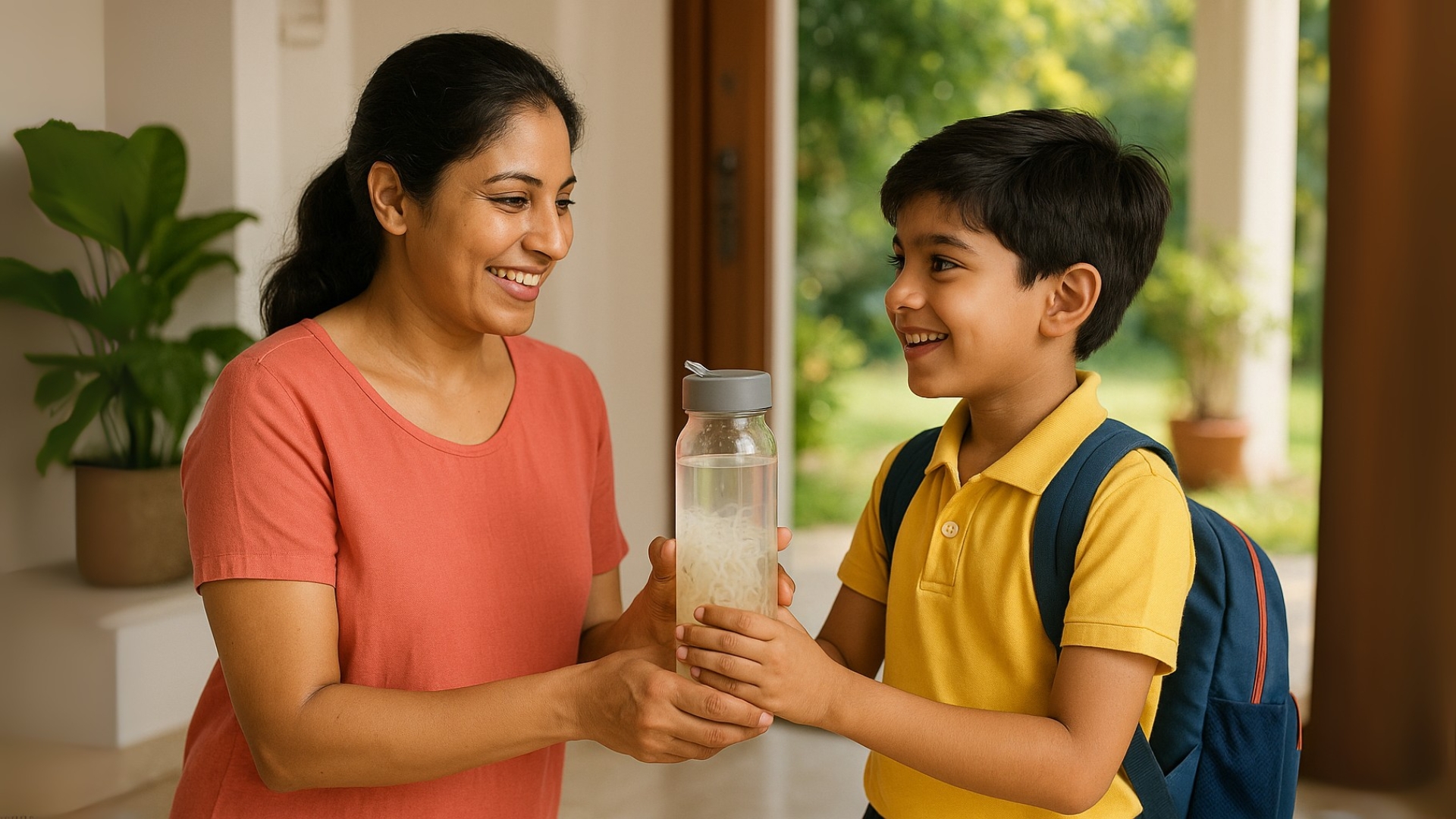
And don’t forget, hydration isn’t just a summer concern. Even in cooler weather, a lack of hydration can silently affect your child’s health. Make sure they’re consistently getting the right fluid intake, and when needed, offer coconut water for dehydration, which many consider the best drink for dehydration besides water, thanks to its natural electrolytes and gentle sweetness.
If you’re unsure whether your child’s nutrition and hydration needs are being fully met, or if you’re dealing with frequent signs of dehydration, it’s always best to consult a professional. For this, you can book a consultation at MoTo Nutrition with Dt. Deepti Gupta today to ensure your child’s diet—including hydration for health—is truly balanced and complete. With expert guidance, you can build lifelong healthy habits for your little one, starting with just one sip at a time.
For more information, go to our Homepage.